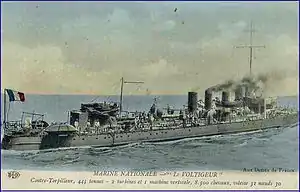 A lithograph of Voltigeur | |
| Class overview | |
|---|---|
| Name | Voltigeur class |
| Operators | |
| Preceded by | Spahi class |
| Succeeded by | Chasseur class |
| Built | 1908–10 |
| In service | 1910–21 |
| Completed | 2 |
| Scrapped | 2 |
| General characteristics | |
| Type | Destroyer |
| Displacement | |
| Length | 63–65.5 m (206 ft 8 in – 214 ft 11 in) (p/p) |
| Beam | 6.4–6.8 m (21 ft 0 in – 22 ft 4 in) |
| Draft | 2.9–3.1 m (9 ft 6 in – 10 ft 2 in) |
| Installed power |
|
| Propulsion | 3 shafts; 1 triple-expansion steam engine and 2 steam turbines |
| Speed | 28 knots (52 km/h; 32 mph) |
| Range | 1,520 nmi (2,820 km; 1,750 mi) at 10 knots (19 km/h; 12 mph) |
| Complement | 76–77 |
| Armament |
|
The Voltigeur class was a pair of destroyers built for the French Navy in the first decade of the 20th century. Both ships survived the First World War and were scrapped afterwards.
Design and description
The Voltigeur class was based on the preceding Spahi-class destroyer, albeit with a different arrangement of propulsion machinery.[1] They had a length between perpendiculars of 63–65.5 meters (206 ft 8 in – 214 ft 11 in), a beam of 6.4–6.8 meters (21 ft 0 in – 22 ft 4 in),[2] and a draft of 2.9–3.1 meters (9 ft 6 in – 10 ft 2 in). Designed to displaced 450 metric tons (443 long tons), the ships displaced 590 t (581 long tons) at deep load.[1]
The destroyers were powered by one triple-expansion steam engines and two direct-drive steam turbine. The steam engines drove the center propeller shaft while the turbine powered the two outer shafts, all using steam provided by four water-tube boilers of two different types. The engines were designed to produce 7,500 indicated horsepower (5,600 kW) which was intended to give the ships a speed of 28 knots (52 km/h; 32 mph). The ships carried 118 t (116 long tons) of coal which gave them a range of 1,520 nautical miles (2,820 km; 1,750 mi) at a cruising speed of 10 knots (19 km/h; 12 mph).[2]
The primary armament of the Voltigeur-class ships consisted of six 65-millimeter (2.6 in) Modèle 1902 guns in single mounts, one each fore and aft of the superstructure and the others were distributed amidships. They were also fitted with three 450-millimeter (17.7 in) torpedo tubes. One of these was in a fixed mount in the bow and the other two were on single rotating mounts amidships.[1]
Ships
- Voltigeur - built by Ateliers et Chantiers de Bretagne, Nantes, launched 23 March 1909, decommissioned May 1920.[1]
- Tirailleur - built by Forges et Chantiers de la Gironde, Bordeaux, launched 27 November 1908, decommissioned July 1921.[1]
Citations
Bibliography
- Couhat, Jean Labayle (1974). French Warships of World War I. London: Ian Allan. ISBN 0-7110-0445-5.
- Freivogel, Zvonimir (2019). The Great War in the Adriatic Sea 1914–1918. Zagreb: Despot Infinitus. ISBN 978-953-8218-40-8.
- Jordan, John & Caresse, Philippe (2019). French Armoured Cruisers 1887–1932. Barnsley, UK: Seaforth Publishing. ISBN 978-1-5267-4118-9.
- Osborne, Eric W. (2005). Destroyers - An Illustrated History of Their Impact. Santa Barbara, California: ABC-Clio. ISBN 1-85109-479-2.
- Prévoteaux, Gérard (2017). La marine française dans la Grande guerre: les combattants oubliés: Tome I 1914–1915 [The French Navy during the Great War: The Forgotten Combatants, Book I 1914–1915]. Collection Navires & Histoire des Marines du Mond. Vol. 23. Le Vigen, France: Éditions Lela presse. ISBN 978-2-37468-000-2.
- Prévoteaux, Gérard (2017). La marine française dans la Grande guerre: les combattants oubliés: Tome II 1916–1918 [The French Navy during the Great War: The Forgotten Combatants, Book II 1916–1918]. Collection Navires & Histoire des Marines du Mond. Vol. 27. Le Vigen, France: Éditions Lela presse. ISBN 978-2-37468-001-9.
- Roberts, Stephen S. (2021). French Warships in the Age of Steam 1859–1914: Design, Construction, Careers and Fates. Barnsley, UK: Seaforth Publishing. ISBN 978-1-5267-4533-0.
- Smigielski, Adam (1985). "France". In Gray, Randal (ed.). Conway's All the World's Fighting Ships 1906–1921. Annapolis, Maryland: Naval Institute Press. pp. 190–220. ISBN 0-87021-907-3.